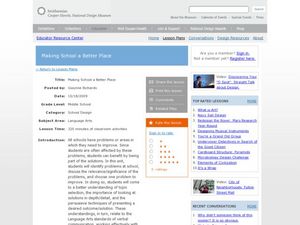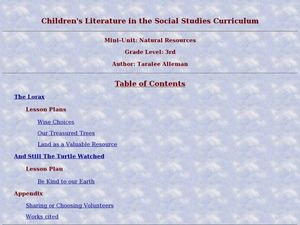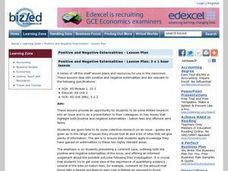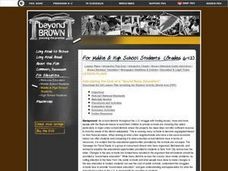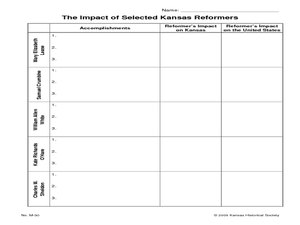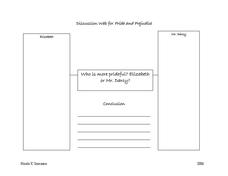Curated OER
Making School a Better Place.
Young scholars study the problems in their school and work on solutions for those problems. In this writing process lesson, students analyze a problem and work as a team to find a solution. Young scholars present written and oral...
Curated OER
The Lorax
Third graders identify environmental problems. In this natural resources lesson students participate in several activities that support critical thinking about the environment and natural resources. The students write, list, and verbally...
Curated OER
U.S. foreign policy in the early Republic
Students research various events during the War of 1812 and then create magazine articles with supporting illustrations, students are in control of their learning.
Curated OER
POSITIVE AND NEGATIVE EXTERNALITIES
High schoolers work as a group to research a current issue, articulate the key points relating to the issue and to have data to support those key points, and use appropriate economic theories to help explain the issues arising.
Curated OER
Calculating the Cost of a "Sound Basic Education"
Students state their opinions about school funding and the use of monetary resources by school districts and use reasons, facts, and examples to support their ideas. They compare sets of data related to school funding and draw...
Curated OER
The Fable of Franny And Her Fabulous Fainting Goat
Mix the art of reading comprehension with the skill of telling time. Children in grades two and three will discuss the importance of goats throughout history based on the provided background information. They'll create cute goat...
Curated OER
Faith-Based Initiatives: Separation of Church and State
Students examine the role of religion in everyday life. In this religion and ethics lesson, students investigate the use of government funds to support faith-based initiatives. The lesson calls for students to conduct research, watch...
Curated OER
The Battle Over Reconstruction: The Aftermath of War
Students explore public sentiment regarding Reconstruction. In this Reconstruction lesson, students analyze primary sources for evidence of the political, social and economic stability of the U.S. following the Civil War. Students...
Curated OER
Understanding Reconstruction in South Carolina
Eighth graders interpret historical evidence presented in primary and secondary resources. In this Reconstruction lesson, 8th graders research the role of Reconstruction in South Carolina by simulating the environment of East Bay Street...
Curated OER
Propaganda
This propaganda PowerPoint provides an overview of propaganda techniques used in advertising and provides information to the audience in order to make informed decisions. The propaganda techniques included are bandwagon, testimonial,...
Curated OER
The Grapes of Wrath: Scrapbooks and Artifacts
Students interpret historical evidence presented in primary and secondary sources. In this Great Depression lesson, students read John Steinbeck's The Grapes of Wrath and use ethnographic research processes...
Curated OER
Meet the Reformers
Seventh graders interpret historical evidence presented in primary and secondary resources. In this American reformers activity, 7th graders research the accomplishments of selected reformers. Students then use the information they...
Curated OER
Abolitionists Worksheet
A table with abolitionists Harriet Tubman, Frederick Douglass, and William Lloyd Garrison provides space to note the race, motivation, and accomplishment of each. Scholars are instructed to write a paragraph about one they'd like to meet...
Curated OER
The Gifts of the Nile
Get your class thinking about the geography that shaped the Egyptian landscape and culture. They compare ancient climate zones and geogrpahical fetures, locate evidence of plate tectonics, take and quiz, and write a short essay. The...
Curated OER
Judges in the Classroom: Unfair of Deceptive Sales Practices
Middle and high schoolers learn to judge fair and unfair sales practices. They read, discuss, and work through hypothetical situations to evaluate whether the sales practices were deceptive or unfair. Handouts are included.
G. Turrell
Science Activity 1: Light & Sound
Are you looking for lab sheets to go with your class experiment on plant response to light? You are no longer in the dark! This is a lesson that was written for a unit on light, but could easily be used to demonstrate plant behaviors in...
Spartan Guides
Infographics Lesson
An infographic is fantastic way for learners to illustrate their understanding of content, express themselves creatively, and teach others in a manner that is both engaging and informative. While originally designed for a lesson on...
Curated OER
Pride and Prejudice: Discussion Web
Both Elizabeth and Mr. Darcy have proud moments, but who is more prideful? Explore Jane Austen's Pride and Prejudice with a discussion web that compares both characters in a brainstorming graphic organizer. Each side provides...
EngageNY
Contrasting Perspectives: Should the Farmworkers in Esperanza Rising Go On Strike? (Chapter 12: "Los Esparragos/Asparagus")
Explore multiple perspectives through a jigsaw activity that will improve your pupils' understanding of the characters in Esperanza Rising as well as their understanding of strikes and human rights. Tapping into prior knowledge, and...
EngageNY
Reading Proficiently and Independently: The Power of Setting Goals
Scholars reflect upon their reading strengths and challenges to create personal reading goals. Participants use goal-setting verbiage in an accordion-style graphic organizer, a first step in writing a letter that details their reading...
California Education Partners
The Road Not Taken
An effective lesson plan truly can make all the difference. Seventh graders read, analyze, and annotate Robert Frost's "The Road Not Taken" before writing an essay about what they believe to be the theme of the iconic poem.
EngageNY
Performance Task Preparation: Peer Critique and Mini-Lesson Addressing Common Errors: Revising Draft Essay to Inform
Time to revise! Using a writing evaluation rubric, scholars participate in a peer editing process to provide feedback on each others' informative essays. Next, pupils begin revising their drafts based on the feedback they receive.
Student Handouts
The Cold War: The Truman Doctrine of 1947
What was the Truman administration's position on foreign policy during the Cold War? Class members respond to an excerpt from President Harry S. Truman's "Truman Doctrine" with three questions in the space provided.
Florida Department of Health
Mental and Emotional Health Education Unit
Stressed out? To begin a mental and emotional health unit, participants take a stress test to determine their level of stress. They study the effects of stress, identify sources of stress in their lives, and learn different ways to...
